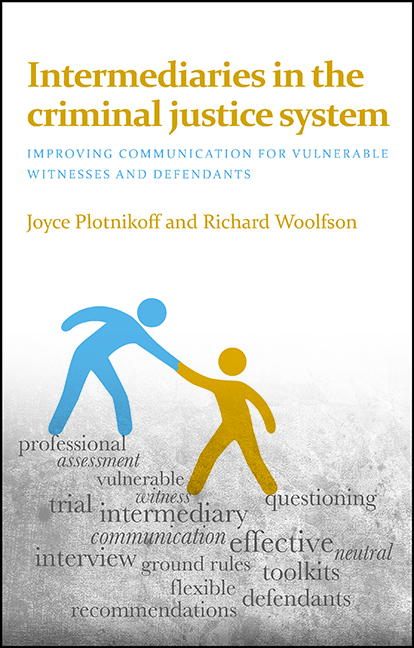 Intermediaries in the Criminal Justice System
Intermediaries in the Criminal Justice System Book contents
- Frontmatter
- Contents
- About the authors
- The Nuffield Foundation
- Acknowledgements
- Foreword
- one Introduction: a fresh pair of eyes
- two The intermediary scheme in England and Wales
- three Behind the scenes: planning to assess the witness
- four Assessment methods and involvement of the interviewer
- five Communication aids and stress reduction strategies
- six Contributing to the effectiveness of the police interview
- seven Negotiating professional space at the ground rules hearing
- eight Making the ground rules hearing effective
- nine ‘Every reasonable step’: preparation for giving evidence
- ten Cross-examination: research, case law, training and regulation
- eleven Cross-examination: intervention at trial
- twelve Cross-examination: challenges at the cutting edge
- thirteen The uneasy position of vulnerable defendants
- fourteen A new profession
- fifteen Conclusion
- References
- Index
- Table of cases
- Legislation
- Rules
- Practice directions
fifteen - Conclusion
Published online by Cambridge University Press: 08 March 2022
- Frontmatter
- Contents
- About the authors
- The Nuffield Foundation
- Acknowledgements
- Foreword
- one Introduction: a fresh pair of eyes
- two The intermediary scheme in England and Wales
- three Behind the scenes: planning to assess the witness
- four Assessment methods and involvement of the interviewer
- five Communication aids and stress reduction strategies
- six Contributing to the effectiveness of the police interview
- seven Negotiating professional space at the ground rules hearing
- eight Making the ground rules hearing effective
- nine ‘Every reasonable step’: preparation for giving evidence
- ten Cross-examination: research, case law, training and regulation
- eleven Cross-examination: intervention at trial
- twelve Cross-examination: challenges at the cutting edge
- thirteen The uneasy position of vulnerable defendants
- fourteen A new profession
- fifteen Conclusion
- References
- Index
- Table of cases
- Legislation
- Rules
- Practice directions
Summary
Intermediaries have helped open the floodgates of change. They provide access to justice to witnesses who were previously excluded and contribute to the fairness of the trial process for both vulnerable witnesses and vulnerable defendants. In a raft of creative ways, intermediaries facilitate ‘best evidence’. When necessary, they take on a coordinating role behind the scenes to ensure policy commitments are delivered. Their innovations have been enshrined in Criminal Procedure Rules, Criminal Practice Directions, the Equal Treatment Bench Book and The Advocate’s Gateway toolkits.
Above all, intermediaries have helped rewrite the ‘rules’ of cross-examination. With the court’s permission, they intervene in questioning as a third party – a dramatic departure from centuries of convention. Despite the adversarial nature of the trial process, they increasingly foster collaboration between the parties and the judge to ensure that questioning is developmentally appropriate. As one judge put it: “The first time I saw an intermediary intervene in cross-examination, I thought it was wondrous. But the miracle is what goes on if they don’t have to intervene at all.” The body of professional knowledge they have brought to the criminal justice system has informed Court of Appeal judgments, not least in relation to restricting the persuasive power of ‘tag’ questions, a term not previously used in a legal context. In the absence of compulsory training, many advocates are changing their practice as the result of exposure to intermediary guidance.
The intermediary contribution to justice and fairness
The overriding objective of the Criminal Procedure Rules is to deal with cases justly. In 2011, Lord Judge, then Lord Chief Justice, called on lawyers to abandon ‘strait-jacketed ideas’ about cross-examination of vulnerable witnesses and defendants, declaring that: ‘The testing of the evidence – which is legitimate, whether of the defendant or the prosecution witnesses – must be fair in that broadest possible sense’ (2011, p 11). This ‘fair’ approach to cross-examination does not impinge on a defendant’s Article 6 rights to a fair trial.
Readers of this book will, we are confident, be persuaded that intermediaries can help the justice system deal with cases more justly and fairly. However, as the book also reveals, their effectiveness is predicated on the actions of others: the police, CPS, judges and lawyers. The empowerment of the intermediary to flag up actual or potential misunderstanding or witness distress is in the hands of the judge.
- Type
- Chapter
- Information
- Intermediaries in the Criminal Justice SystemImproving Communication for Vulnerable Witnesses and Defendants, pp. 303 - 308Publisher: Bristol University PressPrint publication year: 2015


